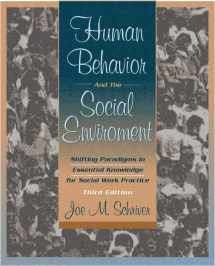
Human Behavior and the Social Environment: Shifting Paradigms in Essential Knowledge for Social Work Practice (3rd Edition)
Book details
Summary
Description
This book compares and contrasts both traditional (dominant) and alternative paradigms or worldviews in examining human behavior and the social environment. Professor Schriver's book is innovative in its examination of new paradigms that include diversity, feminism, client empowerment, and other perspectives that are mandated by CSWE. As the book examines human development within the context of the social environment, both traditional and alternative perspectives on individual development, families, groups, organizations, and communities are explored in the Human Behavior and the Social Environment. At each system level, attention is focused on the need for multiple perspectives that respect the vast diversity of persons and environments with whom social workers work. For example, in addition to traditional perspectives on individual development, such as those of Freud, Kohlberg, Erikson, and Piaget, alternative perspectives on development are provided from feminist, multicultural, and gay-lesbian/bisexual perspectives such as Gilligan, Parham, Helms, and Cass. In each chapter, human diversity, oppression, social and economic justice, social work values and ethics, and populations-at-risk are an integral part of the content presented. For psychologists and social workers.


We would LOVE it if you could help us and other readers by reviewing the book
Book review



